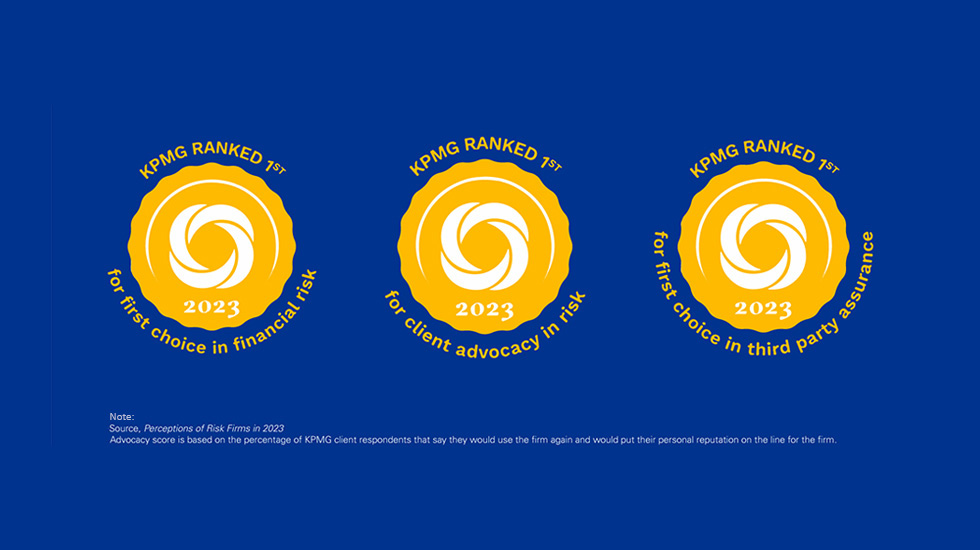Artificial Intelligence and blockchain: The new power couple
Blockchain can be the “bouncer” that generative AI needs, guarding IP, mitigating cyber and regulatory risks, and opening new revenue streams.

All those companies racing to adopt generative artificial intelligence (AI) technology platforms such as ChatGPT and DALL-E to drive innovation—you know, basically every company today—are also still chasing one fundamental question: How do you translate AI into real business results?
Sure, generative AI has been great at generating buzz, and there’s clearly significant potential. But unlocking that potential while also navigating AI’s equally significant risks are now the pressing concerns for business leaders as AI strategy has graduated from the innovation lab to the C-suite.
Make no mistake, though, executives seem to be universally optimistic that AI will drive innovation for their businesses, as we detail in a new report, “2023 KPMG Generative AI Survey,” which captures feedback from 300 executives across a wide range of industries. Among the survey’s key insights:
77%
of the executives see generative AI as the most impactful emerging technology they will use
73%
believe generative AI will increase workforce productivity
71%
plan to implement their first generative AI solution within two years
64%
believe generative AI will help their business gain a competitive advantage.
Even so, it’s hard to ignore the gigantic legal elephant in the room. Because AI learns by scraping all available data—including yours and, potentially, that of your competitors—how can you protect your intellectual property (IP) and avoid the unwitting infringement of IP that others own?
That answer is still unknown, which is why 92 percent of leaders we surveyed think generative AI implementation is a moderate- to high-risk endeavor.
However, one solution may be emerging—ironically enough, from another widely hyped, often misunderstood technology. Allow us to reintroduce you to blockchain.
Has blockchain found its killer app?
Blockchain—a decentralized, distributed technology that’s primarily been used to develop and manage cryptocurrencies, smart contracts, and nonfungible tokens (NFTs)—is being seen increasingly as the AI “bouncer” the business world needs now.
By harnessing blockchain’s immutable and transparent nature, companies can seamlessly integrate valuable IP guardrails into generative AI chatbot training, not only shielding it from misuse but also opening new revenue channels, as we outline in another new KPMG report, “Blockchain and generative AI: A perfect pairing?”
Here are some of the key benefits of leveraging blockchain to protect against AI misuse, detailed further in our new report:
1
2
3
4
5
Securing the (block)chain of command
In many ways, blockchain is generative AI’s ideal technology complement—the grounding rod for AI’s lightning. But, much like AI itself, blockchain is not some silver bullet that, on its own, will unleash AI innovations. The “tech” certainly matters, sure, but so too do the “people” and “process” components.
The work to do ahead is significant. Organizations must adopt and enforce a responsible AI framework—an approach to designing, building, and deploying AI systems in a safe, trustworthy, and ethical manner that will need to include all parts of that people-process-technology equation. That means, for example, ensuring data integrity, statistical validity, and the accuracy of the predicative models—three top concerns cited by executives in our recent “2023 KPMG US AI Risk Survey Report .”
And there’s still much work to be done on that front, as we note in the report, with some apparent gaps in expectations. In one example, somewhat surprisingly, 82 percent of respondents in our AI risk survey said their company had a clear definition of AI and full understanding of their predictive models—except that many of the companies surveyed are also using “blackbox” solutions developed by third parties that simply don’t offer that optimistic level of transparency.
19%
On a related, and also conflicting, note: 19 percent of the respondents said their companies have the expertise they need today to manage many AI risk management tasks.
To successfully manage AI risk, companies must consider their entire AI ecosystem and the complete lifecycles of everything within it—and then design an operating model and processes that reflect leading governance practices for establishing a responsible AI framework.
For more insights around generative AI, explore the 2023 KPMG Generative AI Survey or Our thinking: Blockchain and generative AI.

KPMG recognized as a leader in risk consulting
KPMG is proud to again rank No. 1 across multiple risk advisory categories in the Source study: Perceptions of Risk Firms 2023. These categories include First Choice in Financial Risk; First Choice in Third Party Assurance; and 1st for Client Advocacy in Risk.
Explore more insights and opportunities around generative AI

2023 KPMG Generative AI Survey
An exclusive KPMG survey shows how top leaders are approaching Generative AI

Ready for our lightbulb moment?
Why generative AI is an extraordinary new power source
Meet our team



Subscribe to receive the KPMG Opportunity (In)sight Newsletter
Turn insight into opportunity with unique perspectives and actionable insights addressing the burning issues atop the C-suite agenda. Delivered monthly.